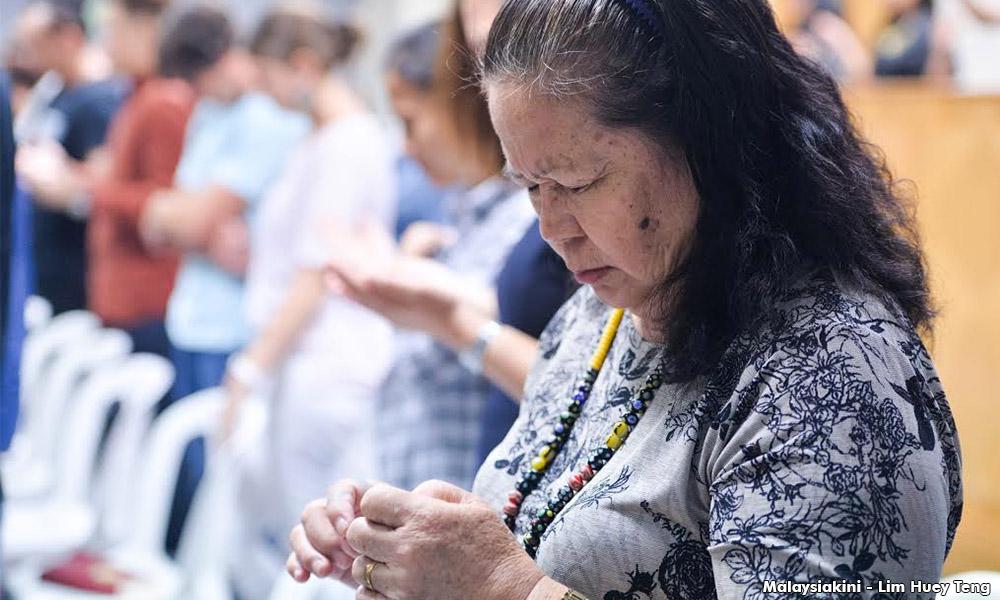
Politicians are elected to represent the interests of the people.
Yet, I can feel the frustration on the ground, especially with the Christian grassroots. A number of issues are, in fact, merely technical in nature, yet they are not solved once and for all.
The only time when a solution appears to be at hand is when we are in the lead-up to a general election. It sometimes looks like we are being held ransom.
It is time that the Christian community realises the power of their votes. If some of these issues are not resolved immediately, the incumbents can kiss our votes goodbye, be it at the federal or state level.
We know that for the Indian community, the problem of stateless children has been a longstanding issue.
In one or two cases that I read about, the children are clearly born in this country; yet it is so difficult to get them an identity card.
With the millions of illegals we have in the country, what is wrong with registering a few thousand of these children who are born in Malaysia, and who will likely live in the country for the rest of their lives? Give them an identity card so that they can live a normal life.
As someone pointed out, there is no need for the MIC, for example, to be involved in getting these children registered especially when the general election is around the corner. Let the National Registration Department and the families rectify the problem themselves.
Identity card woes
Likewise, for the Christian community, it is the change of religion on their identity cards, especially those who have been mistakenly registered as Muslims. There is no reason why a sworn statement is insufficient, especially for cases where the person has been mistakenly registered as a Muslim.
You cannot force religion down anyone’s throat. This is why when I reflect back, the case of a practising Sarawakian Christian, Roneey Rebit should never have cropped up at all.
During the lead up to the 2013 general election, after it was brought to light that Roneey had difficulty in getting his identity card changed, the late chief minister of Sarawak Adenan Satem was prompted to immediately raise the matter with Prime Minister Najib Abdul Razak.
How ridiculous is it for a prime minister to then give the green light for the NRD to change Roneey’s religion on his identity card, when the NRD could have dealt with it on its own?
Just when we thought the issue was over, we are now back to square one, with a case involving four others that was heard in the Federal Court on Monday.
I always ask myself, why do we need to be in such a big mess? Basic human rights - especially the choice of religion by the individual - are hardly respected.
We talk about the incumbents not having the political will to solve these issues at the top, but do we have the political will to show that, if these issues are not resolved, the incumbents will forever kiss our votes goodbye?
Respecting minority interests
As I am pursuing my Master in Christian Studies at a local seminary, I can also understand the frustrations faced by the seminaries.
These seminaries have existed way before the private higher education institutions (PHEIs) came into being. One of them, as I understand it, has been operating for the past 30 years, and it offers all three levels of degrees: Bachelor, Masters and Doctoral degrees.
Yet, these seminaries are having difficulties applying for student visas for their international students. Currently, they are only given special passes on a yearly basis.
The lame excuse that has always been given is that these seminaries are not registered with the Education Ministry (MOE) or Higher Education Ministry (MOHE).
My question to the honourable officers at the Home Affairs Ministry is simple: Since when do seminaries come under the ambit of the Education Act 1996? Even if these seminaries are willing to be registered, would MOHE or MOE accept their registration?
To me, it suffices for these seminaries to be registered with the umbrella body known as the Christian Federation of Malaysia. After all, we are talking of turning Malaysia into a centre of excellence for even theological education. Why do we take such a regressive approach when it comes to international student visas for seminary students?
The irony is that, while these seminary students from third-world countries are being given only special passes when they come with a serious intention to pursue their theological education in Malaysia, PHEIs are striving to ensure that their students attend classes.
I was impressed when I was told by the chief of a particular seminary that they have strict policies with regards to class attendance. If the student fails to attend more than two classes, they are immediately disqualified.
I know this for a fact, because I had to abandon the idea of enrolling for a particular part-time module the moment I was told of the strict policy if I fail to attend more than four hours of classes.
Tell me, can we honestly apply this same policy to the international students registered with PHEIs?
If I may borrow the words from one seminary head, the granting of proper student visas to these international students is indeed an opportunity for the sitting government to prove that Malaysia is indeed a moderate and progressive country whose Muslim community knows how to respect the interests of the minority.
STEPHEN NG is an ordinary citizen with an avid interest in following political developments in the country since 2008. -Mkini
No comments:
Post a Comment
Note: Only a member of this blog may post a comment.